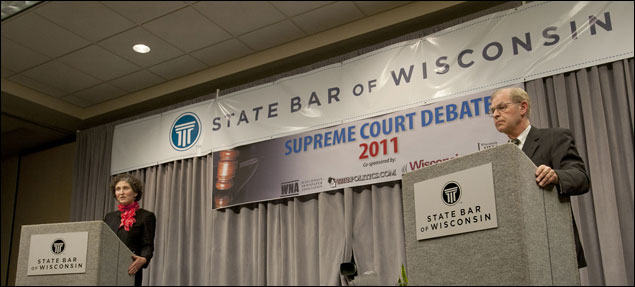Supreme Court candidates spar over partisanship, personal quarrels (VIDEO)
By: David Ziemer, [email protected]//March 29, 2011//
Supreme Court candidates spar over partisanship, personal quarrels (VIDEO)
By: David Ziemer, [email protected]//March 29, 2011//

Wisconsin Supreme Court candidate JoAnne Kloppenburg came out swinging in a debate Monday night with incumbent Justice David Prosser.
From her opening statement at the State Bar’s Madison debate through her closing, Kloppenburg repeatedly attacked the court for engaging in “partisanship” and “personal quarrels” that undermined the “integrity and independence” of the court, and in turn, citizens’ faith in the court.
In turn, Prosser frequently asserted that you cannot promise to “restore” integrity and independence to the court without implicitly asserting that those things aren’t there now, an assertion unlikely to mend fences on a divided court.
Kloppenburg also zeroed in on Prosser, claiming he “has telegraphed he will be part of the conservative majority.”
“Justice Prosser has a partisan approach to his work on the court,” Kloppenburg said during the debate.
Prosser in turn criticized Kloppenburg’s campaign as a character attack on him, and an attempt to turn the election into a referendum on the governor and the budget repair bill.
“That is not the Wisconsin way to select a justice for the Supreme Court,” he said. “It only undermines the court when people like Kloppenburg constantly attack the integrity of the court.”
If elected, Kloppenburg said numerous times she would move the court forward, past partisanship and personal quarrels.
Prosser, in turn, cited a newspaper interview with Kloppenburg’s campaign manager, in which she said she could not identify a single case in which he had prejudged a case or decided a case in a partisan manner.
Asked whether campaign contributions should require recusal of a justice, Kloppenburg answered that the issue is how we can restore integrity to the court, prompting Prosser to respond that you can’t restore integrity by running a campaign to politicize the court.
Noting that the current campaign limit is $1,000 per donor, Prosser remarked that Chief Justice Shirley Abrahamson received many contributions in excess of that during the last campaign for the court, but neither he nor anyone has suggested that she should recuse herself from any cases.
The candidates also differed on how they would approach interpreting the state constitution in light of U.S. Supreme Court precedents addressing parallel provisions in the U.S. Constitution.
Kloppenburg emphasized that the U.S. Constitution is just a floor, not a ceiling, and that the state constitution should be interpreted independent of it.
Prosser, in contrast, called this approach dangerous, and said it creates confusion in the law. Where the words are different, Prosser said, exceptions may be appropriate.
“But we should not depart just because four justices want a different result,” Prosser said.
Asked to cite an example of when they have done something contrary to what they would have liked to have done, because the law required it, Kloppenburg cited notices of claim against the state, and Prosser cited a tort case that came before the court.
Early in her career, Kloppenburg said, she wanted to waive a notice of claim defense, because she believed the plaintiff’s underlying case had merit. But, she did not, and does not, waive defenses.
“What is fair may not be in the interest of the State as a whole,” she said.
Prosser cited a case in which he had initially been part of a 4-3 majority ruling in favor of a plaintiff’s survivors recovering from the defendants, and had been assigned to write the majority opinion.
“But when I tried to write the opinion, it didn’t follow,” he said. “You can’t let empathy rewrite the law. You have to follow the law, and not do what you like.”
Legal News
- FTC bans non-competes
- Gov. Evers seeks applicants for Dane County Circuit Court
- Milwaukee man charged in dismemberment death pleads not guilty
- Democratic-led states lead ban on the book ban
- UW Madison Professor: America’s child care crisis is holding back moms without college degrees
- History made in Trump New York trial opening statements
- Prosecutor won’t bring charges against Wisconsin lawmaker over fundraising scheme
- Republican Wisconsin Senate candidate says he doesn’t oppose elderly people voting
- Vice President Harris to reveal final rules mandating minimum standards for nursing home staffing
- Election workers fear threats to their safety as November nears
- Former law enforcement praise state’s response brief in Steven Avery case
- Eric Toney announces re-election bid for Fond du Lac County District Attorney
WLJ People
- Power 30 Personal Injury Attorneys – Russell Nicolet
- Power 30 Personal Injury Attorneys – Benjamin Nicolet
- Power 30 Personal Injury Attorneys – Dustin T. Woehl
- Power 30 Personal Injury Attorneys – Katherine Metzger
- Power 30 Personal Injury Attorneys – Joseph Ryan
- Power 30 Personal Injury Attorneys – James M. Ryan
- Power 30 Personal Injury Attorneys – Dana Wachs
- Power 30 Personal Injury Attorneys – Mark L. Thomsen
- Power 30 Personal Injury Attorneys – Matthew Lein
- Power 30 Personal Injury Attorneys – Jeffrey A. Pitman
- Power 30 Personal Injury Attorneys – William Pemberton
- Power 30 Personal Injury Attorneys – Howard S. Sicula











